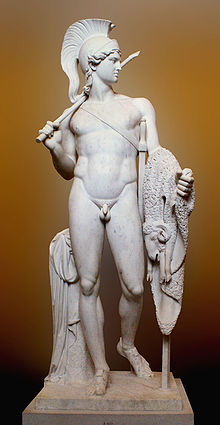 Sculpture of Jason by Bertel Thorvaldsen | |
| Pronunciation | English: /ˈdʒeɪsən/ JAY-sən French: [ʒazɔ̃] |
|---|---|
| Gender | Male |
| Origin | |
| Word/name | Greek |
| Meaning | "Healer" |
| Other names | |
| Variant form(s) | Jaeson, Jaison, Jayson, Jacyn, Jacin, Jasen |
| Nickname(s) | Jay, Jase, Jace |
| Related names | Jacin, Jasen, Jasão |
Jason is a common masculine given name. It comes from Greek Ἰάσων (Iásōn),[1] meaning "healer", from the verb ἰάομαι (iáomai), "heal", "cure",[2] cognate with Ἰασώ (Iasṓ), the goddess of healing,[3] and ἰατρός (iatrós), "healer", "physician".[4] Forms of related words have been attested in Greek from as far back as Mycenaen (in Linear B) and Arcadocypriot (in the Cypriot syllabary) Greek: 𐀂𐀊𐀳, i-ja-te and i-ja-te-ra-ne, respectively, both regarded as standing for inflected forms of ἰατήρ, "healer".[5][6][7]
The name was borne in Greek mythology by Jason, the great Thessalian hero who led the Argonauts in the quest for the Golden Fleece. The name is also found in the New Testament, as the house of a man named Jason was used as a refuge by Paul and Silas.[8] In his case, it could come as a Hellenized form of Joshua.
Its adoption in the United Kingdom peaked during the 1970s, when it was among the top 20 male names, but it had fallen out of the top 100 by 2003.[9]
Jason is the most common spelling; however, there are many variant spellings such as Jaeson, Jaison, Jayson, Jacyn, and Jasen. Jay and Jace are the common diminutives.
A feminine name that sounds similar is Jacin, derived from the Portuguese-Spanish name Jacinta or the Anglicized version Jacinda, meaning hyacinth.[10]
- ^ Slater, William J. (1969). "Ἰάσων". Lexicon to Pindar. Berlin: De Gruyter. At the Perseus Project.
- ^ ἰάομαι. Liddell, Henry George; Scott, Robert; A Greek–English Lexicon at the Perseus Project.
- ^ Ἰασώ in Liddell and Scott.
- ^ ἰατρός in Liddell and Scott.
- ^ ἰατήρ in Liddell and Scott.
- ^ Inscription PY Eq 146, line 9. "The Linear B word i-ja-te". Palaeolexicon. Word study tool of ancient languages. Raymoure, K.A. "i-ja-te". Minoan Linear A & Mycenaean Linear B. Deaditerranean. Archived from the original on 2013-10-13. Retrieved 2014-03-15. "Linear B to Greek: i-ja-te to i-qo". Konoso. 21 December 2013. "PY 146 Eq + frr.: 3 + frr. (1)". DĀMOS: Database of Mycenaean at Oslo. University of Oslo.
- ^ Woodard, Roger D., ed. (2008). "Greek Dialects". The Ancient Languages of Europe. Cambridge University Press. p. 70. ISBN 9781139469326. At Google Books.
- ^ Acts 17:5–9
- ^ www.babynames.co.uk
- ^ Thomas W. Sheehan, Dictionary of Patron Saints' Names, p. 139, at Google Books. Our Sunday Visitor Publishing, 2001. "Jacinta: 'The Hyacinth Flower' (Spanish) or 'The Wearer of Purple' (Portuguese) or 'The Beautiful One' (Spanish). Jacinda: (Greek, Spanish) see Hyacinth, Jacinta."